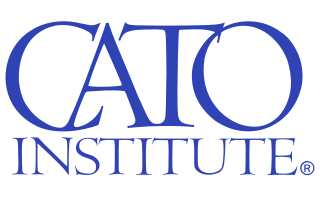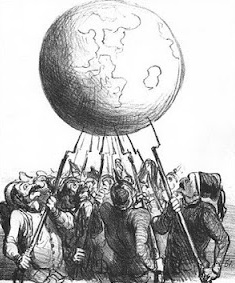Related Research Articles
Pax Americana is a term applied to the concept of relative peace in the Western Hemisphere and later in the world after the end of World War II in 1945, when the United States became the world's dominant economic, cultural, and military power.

The Bush Doctrine refers to multiple interrelated foreign policy principles of the 43rd President of the United States, George W. Bush. These principles include unilateralism, preemptive war, and regime change.

The Reagan Doctrine was stated by United States President Ronald Reagan in his State of the Union address on February 6, 1985: "We must not break faith with those who are risking their lives—on every continent from Afghanistan to Nicaragua—to defy Soviet-supported aggression and secure rights which have been ours from birth." It was a strategy implemented by the Reagan Administration to overwhelm the global influence of the Soviet Union in the late Cold War. The doctrine was a centerpiece of United States foreign policy from the early 1980s until the end of the Cold War in 1991.

The Cato Institute is an American libertarian think tank headquartered in Washington, D.C. It was founded in 1977 by Ed Crane, Murray Rothbard, and Charles Koch, chairman of the board and chief executive officer of Koch Industries. Cato was established to focus on public advocacy, media exposure and societal influence.

Stephen Martin Walt is the Robert and Renee Belfer Professor of International relations at the Harvard Kennedy School at Harvard University and a political scientist.
Grand strategy or high strategy is a state's strategy of how means can be used to advance and achieve national interests in the long-term. Issues of grand strategy typically include the choice of military doctrine, force structure and alliances, as well as economic relations, diplomatic behavior, and methods to extract or mobilize resources.

Robert Jervis was an American political scientist who was the Adlai E. Stevenson Professor of International Politics in the Department of Political Science at Columbia University. Jervis was co-editor of the Cornell Studies in Security Affairs, a series published by Cornell University Press.

Stephen John Hadley is an American attorney and senior government official who served as the 20th United States National Security Advisor from 2005 to 2009. He served under President George W. Bush during the second term of his administration. Hadley was Deputy National Security Advisor during Bush's first term. Before that Hadley served in a variety of capacities in the defense and national security fields. He has also worked as a lawyer and consultant in private practice.
Hegemonic stability theory (HST) is a theory of international relations, rooted in research from the fields of political science, economics, and history. HST indicates that the international system is more likely to remain stable when a single state is the dominant world power, or hegemon. Thus, the end of hegemony diminishes the stability of the international system. As evidence for the stability of hegemony, proponents of HST frequently point to the Pax Britannica and Pax Americana, as well as the instability prior to World War I and the instability of the interwar period.
John Arquilla is an American analyst and academic of international relations.
Offshore balancing is a strategic concept used in realist analysis in international relations. It describes a strategy in which a great power uses favored regional powers to check the rise of potentially-hostile powers. This strategy stands in contrast to the dominant grand strategy in the United States, liberal hegemony. Offshore balancing calls for a great power to withdraw from onshore positions and focus its offshore capabilities on the three key geopolitical regions of the world: Europe, the Persian Gulf, and Northeast Asia.

Gilford John Ikenberry is a theorist of international relations and United States foreign policy, and the Albert G. Milbank Professor of Politics and International Affairs at Princeton University. He is known for his work on liberal International Relations theory, such as the books After Victory (2001) and Liberal Leviathan (2011). He has been described as "the world's leading scholar of the liberal international order."

Wilsonianism, or Wilsonian idealism, is a certain type of foreign policy advice. The term comes from the ideas and proposals of President Woodrow Wilson. He issued his famous Fourteen Points in January 1918 as a basis for ending World War I and promoting world peace. He was a leading advocate of the League of Nations to enable the international community to avoid wars and end hostile aggression. Wilsonianism is a form of liberal internationalism.

The balance of power theory in international relations suggests that states may secure their survival by preventing any one state from gaining enough military power to dominate all others. If one state becomes much stronger, the theory predicts it will take advantage of its weaker neighbors, thereby driving them to unite in a defensive coalition. Some realists maintain that a balance-of-power system is more stable than one with a dominant state, as aggression is unprofitable when there is equilibrium of power between rival coalitions.

Bruce R. Hoffman is an American political analyst. He specializes in the study of terrorism, counter-terrorism, insurgency, and counter-insurgency. Hoffman serves as the Shelby Cullom and Kathryn W. Davis Senior Fellow for Counterterrorism and Homeland Security on the Council on Foreign Relations, and is a professor at the School of Foreign Service of Georgetown University, where he directs its Center for Jewish Civilization. In addition, he is the Professor Emeritus and Honorary Professor of Terrorism Studies at the University of St Andrews, and is the George H. Gilmore Senior Fellow at the U.S. Military Academy's Combating Terrorism Center.

William C. Martel was a scholar who specialized in studying the leadership and policymaking processes in organizations, strategic planning, cyberwarfare and militarisation of space, and technology innovation. He taught at the U.S. Air War College and U.S. Naval War College, and performed research for DARPA and the RAND Corporation. He later become Associate Professor of International Security Studies at the Fletcher School of Law and Diplomacy, a position he held until his death in 2015.

The Bush School of Government and Public Service is an undergraduate and graduate college of Texas A&M University founded in 1997 under former US President George H. W. Bush's philosophy that "public service is a noble calling." Since then, the Bush School has continued to reflect that notion in curriculum, research, and student experience and has become a leading international affairs, political science, and public affairs institution.

Restraint: A New Foundation for U.S. Grand Strategy is a book that was written by Dr. Barry Posen and published in 2014 by Cornell University Press. Posen is the Ford International Professor of Political Science and director of the Security Studies Program at the Massachusetts Institute of Technology (MIT).

William Charles Inboden III is an American academic, writer, and former White House staffer. Inboden is the executive director and William Powers, Jr. Chair of the Clements Center for National Security at the University of Texas at Austin. He also serves as an associate professor of public affairs at the LBJ School of Public Affairs and Distinguished Scholar at the Robert S. Strauss Center for International Security and Law, as well as a Senior Fellow at the Trinity Forum. On June 12, 2023, it was announced that he is joining the University of Florida as the director of the Hamilton Center. He is married to Dr. Rana Siu Inboden.

Reihan Morshed Salam is a conservative American political commentator, columnist and author who since 2019 has been president of the Manhattan Institute for Policy Research. He was previously executive editor of National Review, a columnist for Slate, a contributing editor at National Affairs, a contributing editor at The Atlantic, an interviewer for VICE and a fellow at the University of Chicago Institute of Politics.
References
- ↑ "Bush School of Government and Public Service, Texas A&M University - Faculty Bio - Christopher Layne". bush.tamu.edu.
- ↑ Layne, Christopher. "All Stories by Christopher Layne - The Atlantic". www.theatlantic.com. The Atlantic. Archived from the original on 2015-09-16. Retrieved 2019-04-12.
- ↑ C. Layne. The Peace of Illusions: American Grand Strategy from 1940 to the Present. (Cornell, 2006).
- ↑ Book Review of "The Peace of Illusions: American Grand Strategy from 1940 to the Present" by Peter Gowan
- ↑ Layne, Christopher. "Study Archives | Cato Institute". Cato.org. Retrieved 2020-04-06.
- ↑ RAND Policy Currents. "Christopher Layne". RAND. Retrieved 2020-04-06.
{{cite web}}:|author=has generic name (help) - ↑ "Christopher Layne". theamericanconservative.com.
- ↑ "Christopher Layne". nationalinterest.org. 22 April 2012.
- ↑ Jack Snyder (8 September 2022). "The Crusade of Illusions". Foreign Affairs .(subscription required)
- ↑ Peter Gowan (2006-10-01). "A Radical Realist, NLR 41, September–October 2006". New Left Review . Retrieved 2020-04-06.